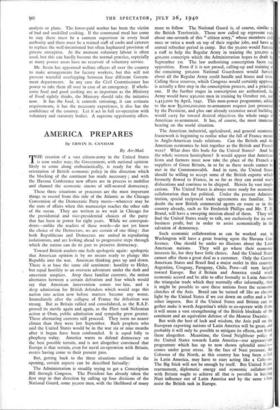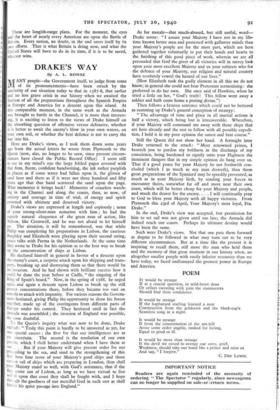AMERICA PREPARES
By ERWIN D. CANHAM
By Air-Mail.
THE creation of a vast citizen-army in the United States is now under way; the Government, with national opinion likely to come along enthusiastically, is ready for the re- orientation of British economic policy in this direction which the blocking of the continent has made necessary ; and with the Havana Conference new efforts are in process to mobilise and channel the economic sinews of still-neutral democracy.
These three situations or processes are the most important things to record from this side of the Atlantic as the Chicago Convention of the Democratic Party meets—whatever may be the state of affairs when this manuscript reaches the other side of the ocean. They are written as we wait in Chicago for the presidential and vice-presidential choices of the party that has been in power for eight years. While we correspon- dents—unlike the readers of these words—do not yet know the choice of the Democrats, we are certain of one thing : that both Republicans and Democrats are united in repudiating isolationism, and are looking ahead to progressive steps through which the nation can do its part to preserve democracy.
Toward British readers one feels apologetic again: apologetic that American opinion is by no means ready to plunge this Republic into the war. American thinking goes up and down. There is at base the same old sentiment: hostility to Hitler, but equal hostility to an overseas adventure under the dark and uncertain auspices. Atop these familiar currents, the nation alternates between a certain defeatism and fear which would say that American intervention comes too late, and a deep admiration for British defenders which would urge this nation into action now before matters become any worse. Immediately after the collapse of France the defeatism was strong. But as Britain rallied and consolidated, as the R.A.F. proved its mettle again and again, as the Fleet took Nelsonian action at Oran, public admiration and sympathy grew greater. These alternating currents still proceed. They seem no nearer climax than they were last September. Rash prophets who said the United States would be in the war six or nine months after it began have been confounded. It is equal folly to phophesy today. America wants to defend democracy on the best possible terrain, and is not altogether convinced that Europe is that terrain, even for naval co-operation with Britain, events having come to their present pass.
But, getting back to the three situations outlined in the opening, certain aspects can be described factually: The Administration is steadily trying to get a Conscription Bill through Congress. The President has already taken the first step in that direction by calling up four divisions of the National Guard, some so,000 men, with the likelihood of many more to follow. The National Guard is, of course, similar to the British Territorials. Those now called up represent only about one-seventh of this "citizen army," whose members drill once or twice a week on top of their regular jobs, and have an annual refresher period in camp. But the so,000 would furnish a staff to help the Regular Army in training the 300,000 to 400,000 conscripts which the Administration hopes to draft by September 1st. The law authorising conscription faces real opposition. Even if it is not passed, calling-up and training of the remaining 3oo,000 National Guardsmen would furnish about all the Regular Army could handle and house and train. Calling these reserves, which Congress would certainly approve, is actually a first step in the conscription process, and a practical one. If the further stages in conscription are authorised, the Army would have 930,000 men in training by October 1st, and 1,47.5,000 by April, 1941. This man-power programme, added to the new $5,000,000,000 re-armament request just presented by the President, and plus onr already extensive naval building, would carry far toward desired objectives the whole range of American re-armament. It has, of course, the most immense bearing on the world situation.
The American industrial, agricultural, and general economic framework is beginning to realise what the fall of France mean, to Anglo-American trade relations. Can the British and the American economies be knit together as the British and French were? What does this bode for the United States? And for the whole western hemisphere? It would appear that American firms and farmers must now take the place of the French as suppliers of Great Britain, in so far as these needs cannot be met in the Commonwealth. And in turn, the United States should be willing to accept some of the British exports which formerly flowed to France, in so far as they can avoid war's dislocations and continue to be shipped. Herein lie vast impli- cations. The United States is always more ready for economic collaboration than for political. Under the present Adminis- tration, special reciprocal trade agreements are familiar. No doubt the new British commercial agents en route or in this country already, such as Sir Frederick Phillips and Mr. T. H. Brand, will have a sweeping mission ahead of them. They will find the United States ready to talk, not exclusively for its own business profit, but in order to assist economically in the salvation of democracy.
Such economic collaboration as can be worked out in Washington will have a great bearing upon the Havana Con- ference. One should be under no illusions about the Latin American nations. They will go where their economic interests lie, for they have little choice. And the United States cannot offer them a great deal as a customer. Only the Central American States and Brazil find a major outlet in this country. Argentina, Uruguay, Paraguay, Chile, Peru—all turn largely toward Europe. But if Britain and America could reach economic accord and be able to offer formally to Lath America the triangular trade which they normally offer informally, then it might be possible to save these nations from the economic clutches of the Axis. Brazil can be turned off like an electric light by the United States if we cut down on coffee and a few other imports. But if the United States and Britain can to- gether make it worth Argentina's while to co-operate with them: it will mean a vast strengthening of the British blockade of the continent and an equivalent defense of the Monroe Doctrine.
But with the best of luck and wisdom, the Axis pull on the European exporting nations of Latin America will be great, and probably it will only be possible to mitigate its effects, not block them altogether. Meantime, the Good Neighbour policy of the United States towards Latin America—our appeasement programme which has up to now shown splendid results- comes under great stress. In the face of Nazi pressure, the Colossus of the North, as this country has long been called in Latin America, may have to start acting like a Colossus. The Big Stick will not be enough by itself. But United States rearmament, diplomatic energy and economic collaboration with Britain ought to achieve all that is possible in keeping Nazi influence out of Latin America and by the same token assist the British task in Europe. These are longish-range plans. For the moment, the eyes and the heart of nearly every American are upon the Battle of Britain. Every nation, no doubt, in the end saves itself by its own efforts. That is what Britain is doing now, and what the United States will have to do in its time, if it is to be saved, whoever wins.































 Previous page
Previous page